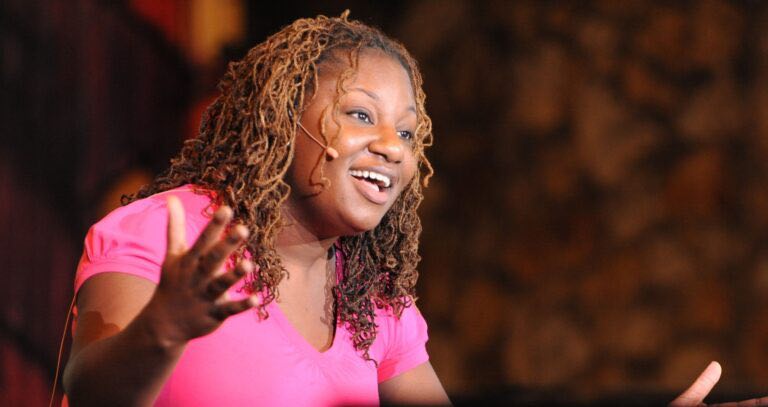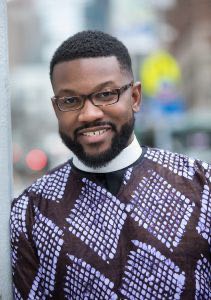
Leaders in the Lutheran and United churches on language and anti-Blackness
Adele Halliday still remembers conversations from a church she attended years ago. The congregation constantly associated whiteness with purity and goodness, and darkness with evil. They talked about people being “washed white” from the blackness of sin.
Language is an important part of Christian worship traditions, whether in Scripture, song, liturgy or prayer. But when this language is unexamined, the result can be alienating—or worse, perpetuate longstanding prejudices, Halliday says.
At the time, Halliday says, “I didn’t feel I had enough personal power to speak up and say, ‘Can you please stop saying this, it is hurting me, it is damaging to my soul.’” Eventually she “voted with [her] feet” by leaving and joining another worshipping community. “But for some people it means leaving [church] completely.”
Halliday is the anti-racism and equity officer for the United Church of Canada, and has been working at the United Church’s national office since 2004 in various capacities, though always related to anti-racism or inter-cultural work.
The United Church’s work on these language issues is based in its anti-racism policy, developed in 2000, Halliday says. One major focus is discouraging the use of “dark” or “black” as synonyms for evil, and words like “light” or “white” as equivalent to goodness.
Often “there’s a particularly detrimental effect on people who are Black, like myself, or racialized in other ways, when you constantly hear ‘black is bad, black is bad,’” says Halliday. That false equivalency impacts people’s self-image as well as how they treat one another, she says.
Halliday says that how we read, understand and interpret Scripture, and how words like “light” and “darkness” are used, is very important. “This can make a significant difference for how people engage in the worship experience and even whether people actually see themselves reflected in the image of God and in our liturgies,” she says.
Halliday says she encourages people not just to avoid these metaphors but to consider a diversity of language around the topic—using “darkness” in positive connotations, for instance.
“How do we think about engaging this in a more expansive way, so that it’s not the only way in which it is described?”
“The Bible is the inspired word of God, the people who wrote it were people who were fallible and were shaped by the context of their time, who had their own biases. So can we talk about that?”
Of course, some of this troubling language appears in our translations of the Bible itself, Halliday says. The goal is not to shy away from the language that’s there, but to talk more deeply about it, she adds. One way to do this is by engaging intentionally with passages through an anti-racist or racial justice lens.
“One thing that we don’t always talk about is [that] the Biblical writers themselves had their own biases…. The Bible is the inspired word of God; the people who wrote it were people who were fallible and were shaped by the context of their time, who had their own biases. So can we talk about that?”
Translators, too, bring their own biases to bear when shaping the Scripture. Halliday points to a verse from the Song of Solomon describing the Shulamite woman, which has been translated variously to say the woman is “Black but beautiful” or “Black and beautiful.”
“That’s a totally different connotation…. One [says] you can be both and there’s no contradiction, and the one is, ‘Well, even though this person is Black, they’re still beautiful—but that’s an exception,’” Halliday says.

Diverse language for a diverse church
“Diversifying what we read or engage [with] or study is important,” says Pastor Lamont Anthony Wells, president of the African Descent Lutheran Association (ADLA), a ministry of the Evangelical Lutheran Church in America (ELCA).
While Wells says using inclusive language is important, he identifies theological education as a way to go back to the source. The works of white writers like Reinhold Niebuhr and Dietrich Bonhoeffer are taught in seminaries as foundational texts, but the work of Black theologians like James Cone—or of Indigenous writers and writers of colour—are considered subjects for elective courses, he says.
“Why is what James Cone has said not given the same prominence, equality, as Bonhoeffer?…. Dietrich Bonhoeffer got his impetus when he studied at a Black congregation in New York … so the value of what we’re receiving from some of our headliner theologians is still rooted in a diversity that the church doesn’t want to accept,” says Wells.
The ADLA brought a resolution to the ELCA’s Churchwide Assembly—its highest legislative body—in 2016 which asked the church to evaluate its Christian education and seminary education department and to include liberation theology in its curriculums. (Liberation theology ties Christian teaching with social justice and political liberation of oppressed groups.)
“For us, liberation theology includes the eradication of anti-Blackness in the church’s liturgy, the church’s teachings and the church’s hermeneutic and interpretation of Scripture,” says Wells.
The 2016 recommendation was passed, but has not been implemented—church governance can tend to move “at a glacial pace,” Wells says—but ADLA continues its advocacy and he is hopeful that it will bear fruit soon.
At the 2019 Churchwide Assembly, the ELCA presented an official apology to people of African descent—“an apology for the years that the church has been complicit in language and in engagement and practice and behaviors that have been … rooted in anti-Blackness,” says Wells, who received the apology on behalf of ADLA.
The apology was important for several reasons, Wells says. “A problem that the church has been complicit in for hundreds of years is racial inequality,” from slavery in the United States to segregation and inequality. “It is important … for us to move forward, because we can’t continue to go in a narrative that everything is okay, because things seem to be more progressive than they were in … the ’50s or ’60s.”
Wells points to a 2015 report from the Pew Research Foundation that found that the ELCA was “the whitest church in America.”
“We are the least diverse church in America—and why is that? Because there are practices, there are behaviors, there are … feelings and moods that prevent full inclusion, racial equality, within our ranks,” he says. The apology was “a beginning,” he adds.
“It shouldn’t just be words … but if this is the beginning of practice, of action, then this is something that we can engage.”
“For us, liberation theology includes the eradication of anti-Blackness in the church’s liturgy, the church’s teachings and the church’s hermeneutic and interpretation of Scripture.”
Halliday too sees diversity within the church as an important part of expanding language.
The United Church’s “Vision for Becoming an Intercultural Church” stresses the importance of diversity to understanding. “Our experiences and understandings are shaped by our cultures,” the document says. “Since we cannot capture the perspective of God through our limited cultural understandings, our understanding of God is limited when we see this God through only one dominant cultural perspective.”
Halliday says she experienced this firsthand at a Bible study she attended as part of a World Council of Churches meeting.
“In this small Bible study there were people from various parts of the world, and we were all reading the same Scripture text. That was by far one of the best Bible studies I’ve ever engaged in, because people talked about, ‘This is what this means in my context’ … Everybody brought their own understanding from their own cultural context. And sometimes they were quite different. There were things I had never thought about in my context.”
How we read and understand Scripture “is almost always better when there are more people present,” she says.
As anti-racism and equity officer, Halliday is developing a national antiracism action plan which will include ideas for engaging with and measuring anti-racism work throughout the United Church of Canada.
Wells says he is hoping to see the ELCA address economic inequality and income gaps within its leadership. “We’re supposed to be counter-cultural, right? So if there’s any area in this world where there should be clear levels of engagement and intentionality to equality, it should be amongst religious institutions.”
Source: Anglican Journal BY JOELLE KIDD



